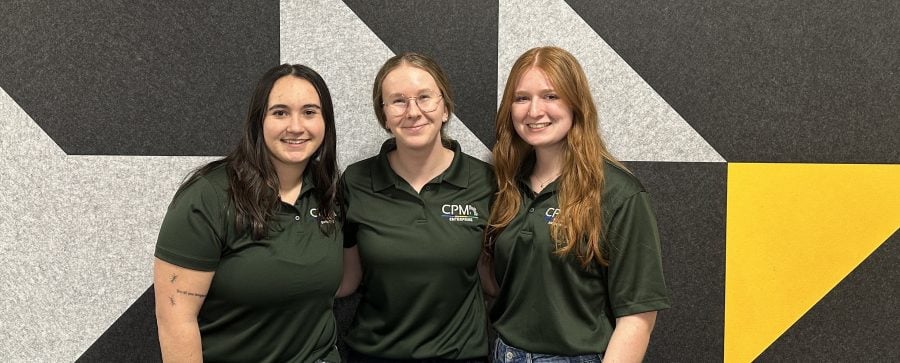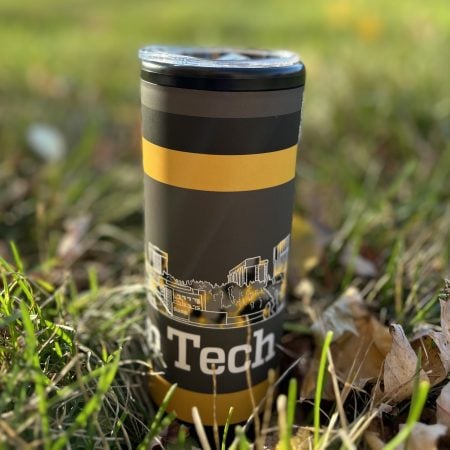
Michigan Tech Enterprise Teams lead to industry partnerships and the kind of experience that employers are looking for. In the case of a Consumer Product Manufacturing Enterprise (CPM) team, the research they conducted led to publication and fewer single-use beverage containers on campus.
CPM enterprise works on multiple projects for multiple years, with the group breaking out into subteams. For their project, the CPM OneTumbler team partnered with campus housing to give all first-year Huskies in 2023’s incoming class a Michigan Tech OneTumbler, as a way to promote sustainability on campus.
Sussex IM, a custom injection molding company based in Sussex, Wisconsin, sponsored the team, working with them as students personalized Michigan Tech designs for the company’s reusable beverage container, OneTumbler. OneTumbler is a BPA-free, double-insulated drink container made in the United States using in-mold label technology.
Most of the reusable beverage containers were handed out during move-in weekend in 2023, as part of the welcome packages given to incoming Huskies. Remaining OneTumblers were gifted to the senior chemical engineering class and other students on campus.

But work on the project didn’t end there. Chemical engineering majors Jacqui Foreman, Madeline Johnson and Zoe Kumm wrapped up the six-semester project in spring 2024. Their Life Cycle Assessment, titled “A Comparison of Single-Use and Reusable Drinkware,” was approved for publication in The Association for the Advancement of Sustainability in Higher Education (AASHE) in the campus engagement category.
Other team members who worked on the project included chemical engineering graduate Brady Good, who was on the team for the first two semesters; mechanical engineering graduate Tyler Hooyman, who was on the team for the second semester; and chemical engineering graduate Casey Fortman, who was a team member during the project’s third and fourth semester.
“It was a good experience for everyone on the team to work with a company out in the real world. Especially with Sussex IM—because it is a smaller, family-owned company we worked directly with the CEO, CTO, and marketing team. ”That is not an experience you get every day,” said Foreman, noting that some team members who were members at the outset of the project were able to tour the plant. “They let us take the project where the team wanted to take it within our predetermined scope. It allowed us, as engineers, to try multiple routes before determining the final outcome.”
Following the concept, design, and distribution phase, the team focused on completing a Life Cycle Assessment. They compared the reusable tumblers to single-use plastic water bottles and paper coffee cups.
Foreman, ’24, who was on the team for all six semesters of the project, explained that a life cycle assessment considers all the raw materials, electricity, other utilities, and transportation used from the beginning of the product’s life to its end, when it is landfilled or recycled. “We used a program called SimaPro, which has a large database that uses average values to cross calculate material production, electricity, transportation, etc. and convert it, in our case to carbon dioxide emissions,” she said. The group entered data for a single OneTumbler, a paper coffee cup and a plastic water bottle.
“This allowed us to scale for multiple uses on a week-over-a-year basis. We determined the weight of the product and packaging through research and measurements. We determined the transportation distance to MTU from plants and distribution centers. We received electricity values from Sussex IM and scaled for the other two beverage containers,” Foreman said. The simulation did the rest of the calculations. “From there we were able to plot the carbon dioxide emissions over time and determine the crossover point when the OneTumbler becomes more sustainable in terms of carbon dioxide emissions.” The point, they found, was after 19 uses of a plastic water bottle and 24 of a paper coffee cup.
Learning the Value of Persistence and Different Perspectives
Throughout the project, team members were presented with challenges. The team held a design competition, working with a QR code and other publicity to get entries from students. When participation wasn’t what they’d expected, they worked with Michigan Tech and the company on their own University-branded designs.
They also successfully navigated various obstacles to get a reasonable price option for distribution.
“We did not always have the outcome and results we wanted from our initiative. Some of the important lessons that came as a result were to keep trying.”
The team used what they learned from the design phase to rethink their approach to gathering student comments about the project. “We took a step back and looked at it from the students’ perspective rather than our own,” said Foreman. The team staffed a table in Wadsworth Residence Hall. “This allowed us to interact face-to-face with the individuals who received the OneTumbler. We got feedback that we would have never received from just a form—and more people filled out the form when we handed it out in person. This helped us make better conclusions about the success of the program.”
Grateful for Great Advisors
During each stage of the project, the team was able to rely on the resources and support of strong advisors. “Professor Emeritus Tony Rogers was the advisor at the start of the project,” said Foreman. “He guided us through marketing and advertisement ideas as well as the first graphic design competition. He let us lead the project. He steered us to people that he knew would be of assistance. We knew he would always be there to answer any questions—and we had a lot!”
Jon Herlivich, professor of practice in chemical engineering, took on the advising role with the team during its full-scale launch with Tech’s Residential Housing and Education program. “He gave us the business perspective and additional marketing techniques to promote CPM as well as sustainability,” said Foreman. Other advisors involved in the project included Professor David Shonnard and Jeana Collins, associate teaching professor and the Gary Sparrow Endowed Faculty Fellow in Chemical Engineering. Robert Handler, assistant professor of chemical engineering, assisted the team with the Life Cycle Assessment. Foreman said Handler and Shonnard offered support for the building of the simulation, along with determining materials that enabled successful modeling. The team was glad to have Collins’ assistance with editing their report before they submitted it for publication. “All of these professors were a major help to the project and it could not have been done without any of them,” said Foreman.
On To Their Bright Futures
Foreman and Johnson graduated in spring 2024 with their bachelor’s degrees in chemical engineering. Kumm, a senior at Tech, is currently working as a processing engineer intern at Domtar.
Johnson, who interned with General Mills prior to graduation, landed a full-time position there. She’s in the company’s rotational program as a manufacturing and engineering associate based at the Chanhassen, Minnesota plant.
Foreman started her career as a process engineer with P&G in August. She credits CPM Enterprise with helping her land both her full-time position after graduation and a previous co-op with TC Transcontinental Package.
“I decided to participate in CPM because I knew it would give me real-world experience while still in college,” said Foreman. “It expanded my knowledge and education as well as heightening my co-op, internship, and full-time opportunities.”
“I also found a passionate, dedicated group of people that I will call friends for life,” said Foreman, who recommends CPM Enterprise as a way for Huskies to find their people and projects they care about at Tech. “The hardest part is deciding what project to be a part of,” she said. “They all have their own challenges but all help you grow.”
About the College of Engineering
Michigan Tech’s College of Engineering offers more than 15 bachelor of science degrees in biomedical engineering, chemical engineering, civil, environmental and geospatial engineering, electrical and computer engineering, engineering fundamentals, geological and mining engineering and sciences, manufacturing and mechanical engineering and technology, materials science and engineering, and mechanical and aerospace engineering.
Our engineering graduate degree options include master’s and PhD programs, along with robust online certificate programs for busy professionals. Follow Michigan Tech Engineering on Facebook, Instagram, LinkedIn, and Twitter for the latest happenings.